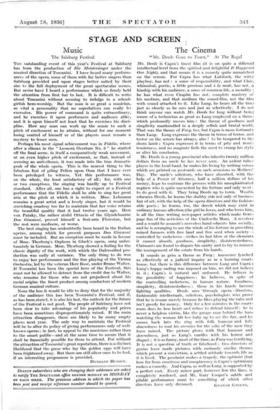"Mr. Deeds Goes to Town." At The Regal
The Cinema
Mr. Deeds is Capra's finest film (it is on quite a different intellectual level from the spirited and delightful It Happened One Night), and that means it is a comedy quite unmatched on the screen. For Capra has what Lubitsch, the witty playboy, has not : a sense of responsibility, and what Clair, whimsical, poetic, a little precious and d /a mode, has not, a kinship with his audience, a sense of common life, a morality ; he has what even Chaplin has not, complete mastery of his medium, and that medium the sound-film, not the film with sound attached to it. Like Lang, he hears all the time just as clearly as he sees and just as selectively. I do not think anyone can watch Mr. Deeds for long without being aware of a technician as great as Lang employed on a them., which profoundly moves him : the theme of goodness and simplicity manhandled in a deeply selfish and brutal world. That was the theme of Fury, too, but Capra is more fortunate than Lang. Lang expresses the theme in terms of terror, and terror on the screen has always, alas ! to be tempered to the. shorn lamb ; Capra expresses it in terms of pity and ironic tenderness, and no magnate feels the need to cramp his style or alter his conclusion.
Mr. Deeds is a young provincial who inherits twenty million dollars from an uncle he has never seen. An ardent tube- player in the local band, he makes his living by writing verses which are printed on postcards on such occasions as Mothers' Day. The uncle's solicitors, who have absorbed, with the help of a Power of Attorney, half a million dollars of his money, hope to continue the process with his unsophisticated nephew who is quite unexcited by his fortune and only want ; to do good with it. They bring Deeds up to town. Wealth educates Deeds, he learns the shabby side not only of business but of art, with the help of the opera directors and the fashion. able poets ; he learns, too, the deceit which may exist in ordinary human affection (the girl he loves, and who loves him, is all the time writing newspaper articles which make front- page fun of the activities of the Cinderella Man). A revolver and a would-be assassin's nerveless hand educate hint socially, and he is arranging to use the whole of his fortune in providing ruined fanners with free land and free seed when society— controlled by racketeers—strikes its last blow at the elements it cannot absorb, goodness, simplicity, disinterestedness. Claimants are found to dispute his sanity and to try to remove the management of the estate from his hands.
It sounds as grim a theme as Puny ; innocence lynched as effectively at a judicial inquiry as in a burning court- house, but there is this difference between Lang and Capra : Lang's happy ending was imposed on him, we did not believe in it ; Capra's is natural and unforced. He believes in the possibility of happiness ; he believes, in spite of
the controlling racketeers, in human nature. Goodness, simplicity, disinterestedness : these in his hands become fighting qualities. Deeds sees 'through opera - directors, fashionable intellectuals, solicitors, psychologists who prove that he is insane merely because he likes playing the tuba and isn't greedy for money. Only for a few minutes in the court- room does he lose heart and refuse to defend himself : he is never a helpless victim, like the garage man behind the bars watching the woman lift her baby up to see the fun, and he comes back into the ring with folk humour and folk shrewdness to rout his enemies for the sake of the men they have ruined. The picture glows with that humour and shrewdness, just as Lang's curdles with his horror and
disgust ; it is as funny, most of the time, as Fury was terrifying. It is not a question of truth or falsehood : two directors of genius have made pictures with curiously similar themes
which present a conviction, a settled attitude towards life as it is lived. The pessimist makes a tragedy, the optimist (but how far from sweetness and complacency is Capra's optimism)
makes a comedy. And Capra, as well as Lang, is supported by a perfect cast. Every minor part, however few the lines, is completely rendered, and Mr. Gary Cooper's subtle and pliable performance must be something of which other directors have only dreamed. G11.111.131 GREENE.






































 Previous page
Previous page